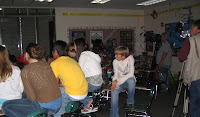General contact: Ken Palke, 503.947.5286 Program contact: Wendy Hausotter, 503.945.9703
Thousands of Oregonians will be admiring the artistic endeavors of a dozen middle school students during 2008 on an Oregon Department of Human Services color calendar designed to increase awareness of problem gambling.

Approximately 75,000 Oregon adults experience problems related to their gambling, which also impacts children and families.
Earlier this year the DHS Addictions and Mental Health Division sponsored its fifth annual middle school poster contest to help students learn more about the risks of gambling and to alert parents and educators that problem gambling can be a serious health issue.
A dozen posters were chosen from several hundred entries submitted by students around the state. Many posters were created during Problem Gambling Awareness Week in March. Gift certificates ranging from $25 to $100 were awarded to two teachers and the 12 students selected.
The student artists are (grade and school at time of submission listed):
- January: Megan Tilley, 7th grade, Jefferson Middle School, Jefferson
- February: Amy Senestraro, 6th grade, Ashland Middle School, Ashland
- March: Marissa Parr, 8th grade, Jefferson Middle School, Jefferson
- April: Julie Meyer, 8th grade, Heppner High School, Heppner
- May: Trace Byrd, 8th grade, The Dalles Middle School, The Dalles
- June: Chandra Sinnott, 8th grade, Central Linn High School, Halsey
- July: Brianna Dweg, The Dalles Middle School, The Dalles
- August: Katy Cheung, 8th grade, Monroe Middle School, Eugene
- September: Natalie Tolmachoff, 8th grade; Mark Twain Middle School, Silverton
- October: Jacob Young, 7th grade, Monroe Middle School, Eugene
- November: Bailey White, 7th grade, Ontario Middle School, Ontario
- December: Sydney Sprague, 7th grade, Monroe Middle School, Eugene
Ten thousand calendars were circulated to many local DHS offices, schools and community organizations and are available free of charge. Telephone 503.945.6187 for details.
Free problem gambling treatment is available statewide. To reach the free and confidential Oregon Problem Gambling Hotline, telephone 1-877-MY-LIMIT or visit 1877mylimit.org.
DHS manages the Lottery-financed problem-gambling program as part of its services to prevent and help Oregonians overcome the negative effects of addictions. More information about problem gambling is available on the DHS Web site at http://www.oregon.gov/DHS/addiction/gambling.shtml#aware.
DHS will soon launch a similar search for art for next year's problem gambling awareness calendar. Middle schools and community groups working with middle school aged children will receive information in January. The deadline for the 2009 Problem Gambling Awareness Art Search will be March 21. An entry form is also available by calling 503-945-6187.
(Note to editors: Student calendar artwork is available in PDF format. Call 503.947.5286). ###












